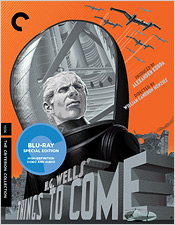Things to Come (Blu-ray Review)

Director
William Cameron MenziesRelease Date(s)
1936 (June 18, 2013)Studio(s)
London Film Productions/UA (Criterion - Spine #660)- Film/Program Grade: A-
- Video Grade: A-
- Audio Grade: A-
- Extras Grade: A-
Review
Considered one of Britain’s finest science fiction films (possibly of all time), Things to Come tells the story of what would have happened if Britain had gone to war, specifically World War II (which they eventually did). The films follows the exploits of a nation that goes through plague, tyranny and rebirth after a collapse in society. The film is the product of many creative minds including H.G. Wells (author), William Cameron Menzies (director), László Moholy-Nagy (special effects) and Georges Périnal (cinematographer), all of whom were quite meticulous with the film.
Although it doesn’t quite stand the test of time like its predecessor Metropolis, Things to Come is by no means a slouch. It’s a beautifully-designed film with a strong concept that was executed to the best of everyone’s abilities at the time. A lot of money was spent on this sci-fi epic, and while it wasn’t the most successful in the genre, it’s certainly one of the most stylistic. It stems mostly from sci-fi guru H.G. Wells, who wrote the original novel that the film is based upon. Not only did he have say in the writing process, but also in the production design as well. All of the key players behind the scenes had backgrounds in design in one way or another, so it comes as no surprise that the film is impeccably well put together and extraordinary to look at it. The ideas that it conjures up are fundamental to human existence while the story itself spans many years with many different characters with Cabal, the future leader of Britain, being the closest to a central character. It’s not altogether a perfect film by today’s standards as some of the effects don’t hold up to close scrutiny, but one can’t help but marvel at its look, scope and ingenuity.
It’s also a film that was available in many different versions over the years since and after its original theatrical release. It was released in the UK at around 109 minutes and later in the US at 97 minutes. In between, re-releases on both sides of the Atlantic ranged anywhere from 73 to 92 to 108 minutes in length. The longest surviving version is what was used for this Criterion release, which is sourced from a new 4K restoration of a print held by the British Film Institute. I’ll note here that I haven’t seen the UK Blu-ray release of the film, which seems to have a different restoration of the same film print, so I’ll just dismiss it altogether and focus on what I have at hand. The results for this restoration are very good. The print is very much intact, and having never seen the film previously, I didn’t really notice anything missing. Picture quality is lovely. There’s a very healthy grain structure, even amidst all of the frantic cutting toward the beginning. Blacks and whites are very strong, while contrast is mostly good. There’s some softness to the image at times and a few film scratches and lines left behind, but it’s a strong and stable image nonetheless. The soundtrack is surprisingly good, as well. The English mono track, which is uncompressed, sports a very comfortable soundtrack. Dialogue is perfectly clear and audible and the sound effects and music interlace quite well together. It shows its age, especially with the lack of dynamic range, but it’s perfectly clear and shouldn’t call attention to itself. There are also subtitles in English for those who might need them.
For the supplements, you get a nice bounty to dig through. There’s an audio commentary with film historian and writer David Kalat; an interview with writer and cultural historian Christopher Frayling on the film’s design; a visual essay with film historian Bruce Eder on Arthur Bliss’ musical score; unused special effects shots as well as a video installation piece by Jan Tichy to go with them; an audio recording from 1936 of a reading from H. G. Wells’ writing about the plague Wandering Sickness from the film; and finally, a 20-page booklet with a new essay by critic Geoffrey O’Brien. Despite the fact that the UK Blu-ray release has more extras than this release, it’s still very solid.
Overall, this is another fantastic Blu-ray from Criterion. Although it was in the public domain for many years and many cheaper incarnations of the film on DVD can still be found, this is the release of Things to Come that you’ll want to get.
- Tim Salmons

